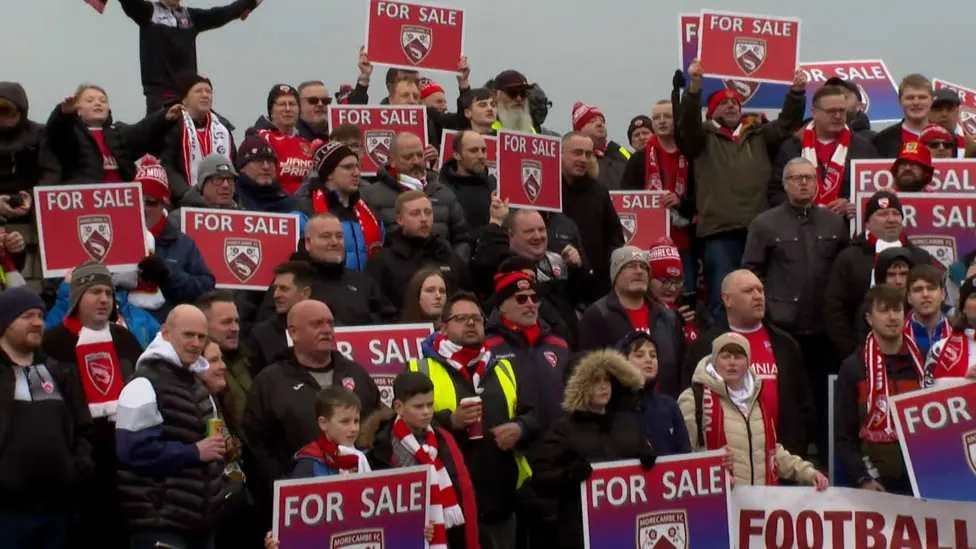In its post-war heyday, the town of Morecambe was one of the UK’s foremost seaside holiday destinations, with a thriving local economy and prestigious reputation.
Since the decline of the domestic tourism industry which underpinned Morecambe’s boon, its 105-year-old football club has filled the gap – providing jobs, powering local businesses, and offering a sense of community, identity, and spirit.
But now, Morecambe FC faces the imminent prospect of shutting down due to a deepening financial crisis, with owner Jason Whittingham’s failure to sell the club leading to suspension from the National League.
For proud local people, the impact is enormous.
“It’s absolutely horrible”, says Alison Williamson, a Morecambe resident who began supporting the club in 1974. “The football club gives so much to the town. It’s just so sad that Whittingham is down in Essex and allowed to take it all away from us.
“It’s kind of a grieving process. It’s like losing a member of your family that has always been there. Even if you don’t see them all the time, when they’re not there anymore, you suffer and you feel the loss.”
The club’s players were sent home a week ago and are unable to train because of a lack of insurance cover. The academy has now also stopped functioning.
For some, the slow, painful deterioration of their football club threatens the cohesion of the community and mimics the previous era’s erosion of the local economy.
“Morecambe used to be fantastic in its heyday,” says Les Dewhirst, the club’s kit man for the past 30 years. “It had everything from small zoos to fairgrounds to theatres and piers. We’ve not got much of that now, but it’s still a cracking place and football is such a big part of it.
“I met my wife at the football. We were second-timers and our kids have grown up coming to this ground together. Strangers stop me in the street and say ‘hiya Les’ and it feels good.
“I don’t know all the names of the people who come here, but I know all the faces. We all come here for the same reason – because we care.”
That level of care means supporters, led by fans group The Shrimps’ Trust, have been protesting against Whittingham’s ownership of the club and demanding he sell up for years.
Takeover deals have been agreed in the past but nothing has come to fruition and fans face the prospect of having no club to support in the upcoming season.
“This place is half of my life”, says Kate Barker, a fan and former chief steward for 20 years who was subsequently made honorary life vice-president. “All my good friends are here. It’s a cliche, but we are a family and we look after each other.
“We always look forward to seeing each other on a Tuesday and a Saturday, and going to see a match. We might win, lose, or draw – the result doesn’t really matter. We’ve never let football get in the way of a good day out.”
“We’ll still gather together and talk about the old times, what we’ve done and where we’ve been. But we should still be able to do it here, every week,” adds Barker.
“Inside I’m being absolutely torn apart.”
Where once on the town’s seafront there were multiple fairgrounds, theatres, piers and miniature zoos, there are now a smattering of bars and restaurants, many of which are funded by matchday income and travelling away supporters.
The club’s peril means local businesses are now at risk.
“The winter months are the hardest here, because it’s the seaside,” says Chris Donaldson, owner of The Royal Hotel on the seafront. “The football season sees us through that.
“I’ve got 19 bedrooms here and away fans are coming from all over fully booking them weeks in advance. The whole town can be full.
“It’ll cost us tens of thousands, easily. It’s crazy what it’ll do to the town to lose that kind of money. Everyone will feel the effect of it.”
For staff at the fans’ matchday pub, the difference in demeanour is already stark.
“We get around 400, 500 people on a matchday,” says Michael Woolworth, manager of the Hurley Flyer opposite the stadium. “It feels like everyone in Morecambe is in here.
“It’s a ritual every weekend. In here we see that football really brings people together.
“But in the last few months we’ve seen the happiness taken away from them. We have regulars who have come in visibly upset.”
Morecambe FC has been one of the area’s biggest employers in recent times. But the club’s financial issues mean that salaries paid to staff and players have been delayed or not paid at all in some months. Dewhirst was last paid in May.
“I’m eating into my savings now,” he says. “Some people aren’t lucky enough to have savings – some are going to food banks because they can’t afford to buy their shopping.
“It’s been hard watching players leave. There was another one gone yesterday. I’ve known lots of them for years.
“I feel broken. Numbness has set in.”











